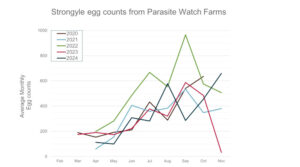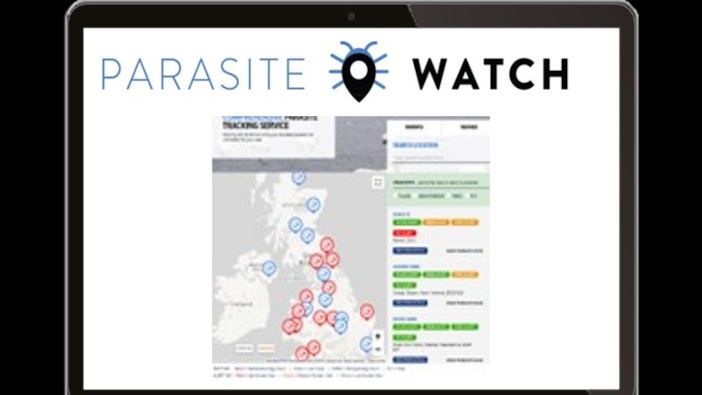Data from the Zoetis Parasite Watch Scheme, which collates data from farms regularly monitoring faecal worm egg counts (FWEC) in lambs, has shown unexpectedly high strongyle (roundworm) burdens, even running into autumn last year.
Figures show that egg counts began to rise in May, peaking in August when the highest count of almost 600 eggs per gram (EPG) was recorded.
While counts dipped again mid-to-late season, there was an uptick to 650 EPG in November.
“This is different to previous years when egg counts typically stayed high during summer and fell during the autumn as the weather turned colder.” Zoetis Vet Patricia van Veen said. “It highlights the importance of conducting regular faecal egg count tests for monitoring and drench efficacy to prevent unnecessary lamb losses.”
Independent sheep consultant Nerys Wright echoed this sentiment: “This clearly shows there is no such thing as a regular worm season due to changing weather patterns. I would encourage farmers to remain alert to the risk of parasites later in the season and continue to monitor egg counts to ensure we are treating when it is needed.”
Nerys advised that farmers start to monitor worms when lambs are eating enough grass, at which point they are likely to ingest worm larvae. This is usually around six weeks of age. From this point, counts should be taken every three weeks, using 10-15 dung samples from each group of lambs.
 “Samples should be taken from a representative number of lambs in the group. Samples should be collected when fresh, ideally still warm to the touch. If samples cannot be sent to the lab immediately, they must be stored airtight in a fridge to prevent them from heating and worm eggs from hatching,” she warned.
“Samples should be taken from a representative number of lambs in the group. Samples should be collected when fresh, ideally still warm to the touch. If samples cannot be sent to the lab immediately, they must be stored airtight in a fridge to prevent them from heating and worm eggs from hatching,” she warned.
If FWEC reports come back with over 400-500 EPG, it can indicate a high challenge, although some lambs will handle this better than others. Alongside this, monitoring of growth rates and ewe body condition can also indicate strongyle infection.
“Regular faecal egg counting in sheep will help you build a picture of what’s happening on your farm and help preserve the efficacy of all wormers.”
It’s possible to use Parasite Watch, which tracks parasite infections. The service is free to use and will send out alerts.


